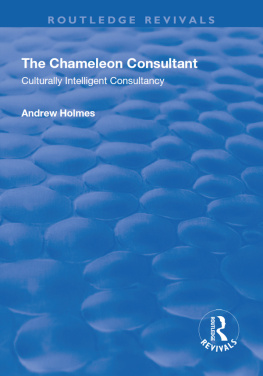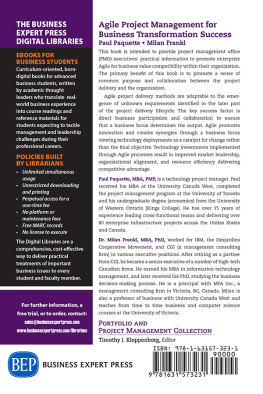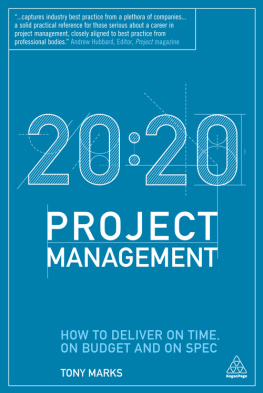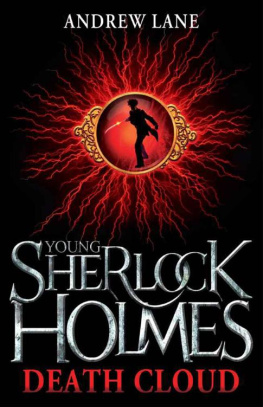Failsafe IS Project Delivery
To Sally, Thomas and Elizabeth
Failsafe IS Project Delivery
Andrew Holmes
First published 2001 by Gower Publishing
Reissued 2018 by Routledge
2 Park Square, Milton Park, Abingdon, Oxon OX14 4RN
711 Third Avenue, New York, NY 10017, USA
Routledge is an imprint of the Taylor & Francis Group, an informa business
Copyright Andrew Holmes 2001
Andrew Holmes has asserted his right under the Copyright, Designs and Patents Act 1988 to be identified as the author of this work.
All rights reserved. No part of this book may be reprinted or reproduced or utilised in any form or by any electronic, mechanical, or other means, now known or hereafter invented, including photocopying and recording, or in any information storage or retrieval system, without permission in writing from the publishers.
Notice:
Product or corporate names may be trademarks or registered trademarks, and are used only for identification and explanation without intent to infringe.
Publisher's Note
The publisher has gone to great lengths to ensure the quality of this reprint but points out that some imperfections in the original copies may be apparent.
Disclaimer
The publisher has made every effort to trace copyright holders and welcomes correspondence from those they have been unable to contact.
Typeset in Utopia by Bournemouth Colour Press, Parkstone.
A Library of Congress record exists under LC control number: 00044276
ISBN 13:978-1-138-73345-9 (hbk)
ISBN 13:978-1-315-18766-2 (ebk)
A number of years ago I was sitting in my tutor's office at the London School of Economics (LSE) discussing the dissertation for my MSc. At the time I was working on an information systems project which had not gone as well as planned. Indeed, the system failed to function properly, caused immense problems to the organization, and was personally a painful experience.
At the time, I had no clear understanding of why it had been such a disaster, and as a means of dealing with it, externalized it by blaming management, the users - anyone but me. But was it purely down to my own incompetence? My tutor had a research interest in information systems project failure, and recommended I look into the issue in greater detail. The touch-paper had been lit.
The dissertation came and went, but my desire to try and understand why information systems projects fail remained. From personal experience, research with the LSE, and discussions with those who had experience of failed projects, it was clear that there were no simple answers. It also became obvious that there were some serious issues that had to be resolved within the wider business and technology communities, before the regularity of failure could be reduced. I also noticed that there had been no attempt to describe or manage the issues from a holistic perspective.
There have been many texts, processes, methods and management techniques that purport to solve the problems once and for all. Suffice it to say, none of these has been truly successful, universally applicable to understanding, and able to resolve the problems associated with software project failure. The majority have failed to provide anything more than motherhood statements and arguably inappropriate solutions. From my research, I recognized that software projects present unique problems to organizations and require a concerted organizational effort to resolve them. They cannot be tackled in a piecemeal fashion.
Six years later, having conducted further research into the problems, I have finally put pen to paper; I am continually depressed by the lack of understanding of the key issues associated with failure, and the continued search for the elusive silver bullet, that is, the catch-all solution to all the ills associated with software, and particularly software development projects.
Whenever I am in a position to discuss the issues covered within this book, I am often confronted by the usual 'why concentrate on failure?' question. Surely, it would be far better to discuss what constitutes a successful information system project? Indeed it would, but there seem to be so few of these, that it is difficult to draw out common themes without reducing them to trite and simplistic statements such as 'involve the users'. Success also has the tendency to breed complacency, which is a danger in itself. With the larger number of failures, and the vigilance that failure can bring, understanding why failures occur may be one of the surest ways to breed a successful information systems project. Also, in raising the level of awareness of failure, it is hoped that fewer project managers and organizations will suffer the ignominy of failure in the future.
ANDREW HOLMES
Writing a book is always, to a lesser or greater extent, a collaborative exercise, I would like to thank the many people who have given me the necessary encouragement required to maintain the high levels of effort to produce this book. There are, of course, one or two people who are worthy of a specific mention. In particular, I would like to thank David Jacobs of profit for information, and Shan Shanthakumer of the Executive Studio at the West London Tech. who kindly contributed their thoughts and ideas on how the culture gap between business and IT might be resolved. I would also like to thank Mike Woodman, of Sema Group Consulting, who, back in the summer of 1998, gave me the push I needed to start writing the book.
Furthermore, writing this book has not been without its trials and tribulations; loss of confidence, creative blocks, and so on. Throughout the last twelve months, my wife Sally has provided me with immense support not only through encouragement, but also in reviewing each chapter as it was completed. I would live in fear of her reviews, as I knew she took it seriously, and would provide me with valid, and often brutal criticism. This has, in my opinion, allowed me to provide the reader with a higher quality product; thank you Sally.
AH
Computers were probably the most important technology to have emerged in the twentieth century. In the relatively short space of forty years, they became central to the efficient operation of most industrialized nations. It is now recognized that many industries, organizations and government bodies could not operate efficiently, and in some cases not at all, without them. Therefore, a significant proportion of organizations can now be considered information technology (IT) centric. That is, their ability to function within the increasingly competitive global economy is only possible through the effective and continued application of IT. Furthermore, the general trend towards greater computerization, and the merging of information and communication technologies, is creating an environment in which technology is becoming the dominant component of almost any modern enterprise.
Thus, organizations, through their increasing dependence on IT, seek out the latest technological solution that will provide them with, or maintain, their competitive advantage. But technology and its application presents a paradox - the more you have, the more you need, because without it, competitive advantage can be very short-lived. Product and service life cycles have been reduced by IT's ability to increase the immediacy of product and service need. Thus, the application of IT has created an environment that both encourages dependency upon it, and speeds up the already frenetic pace of change.













